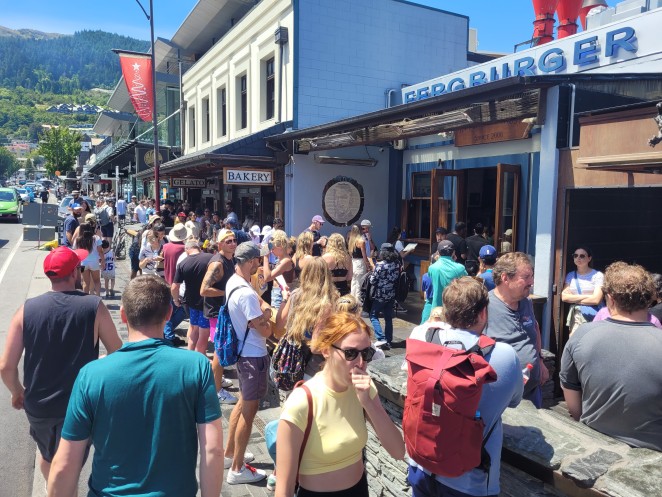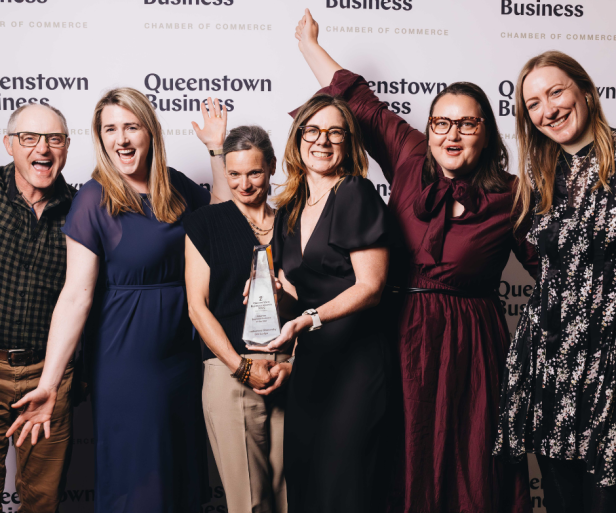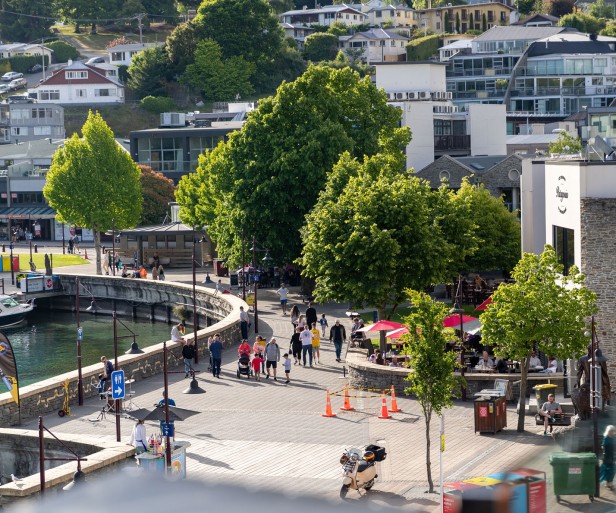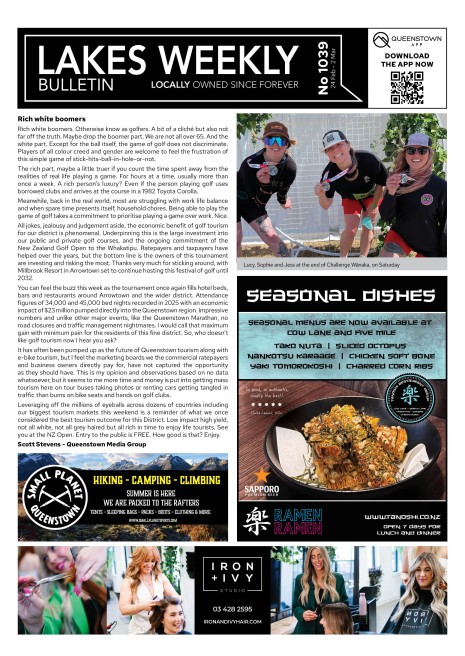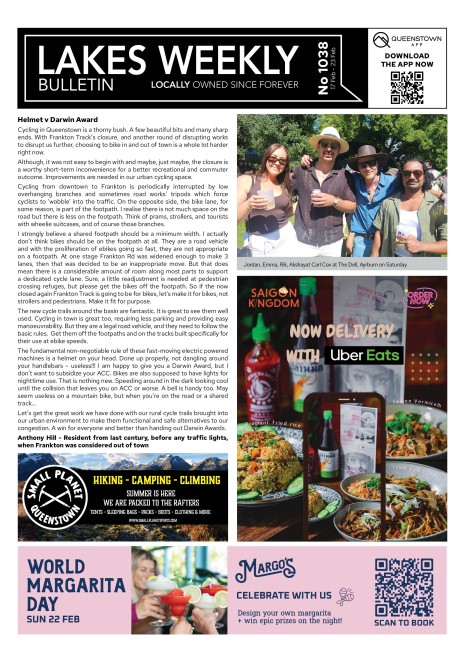Strong summer before domestic squeeze
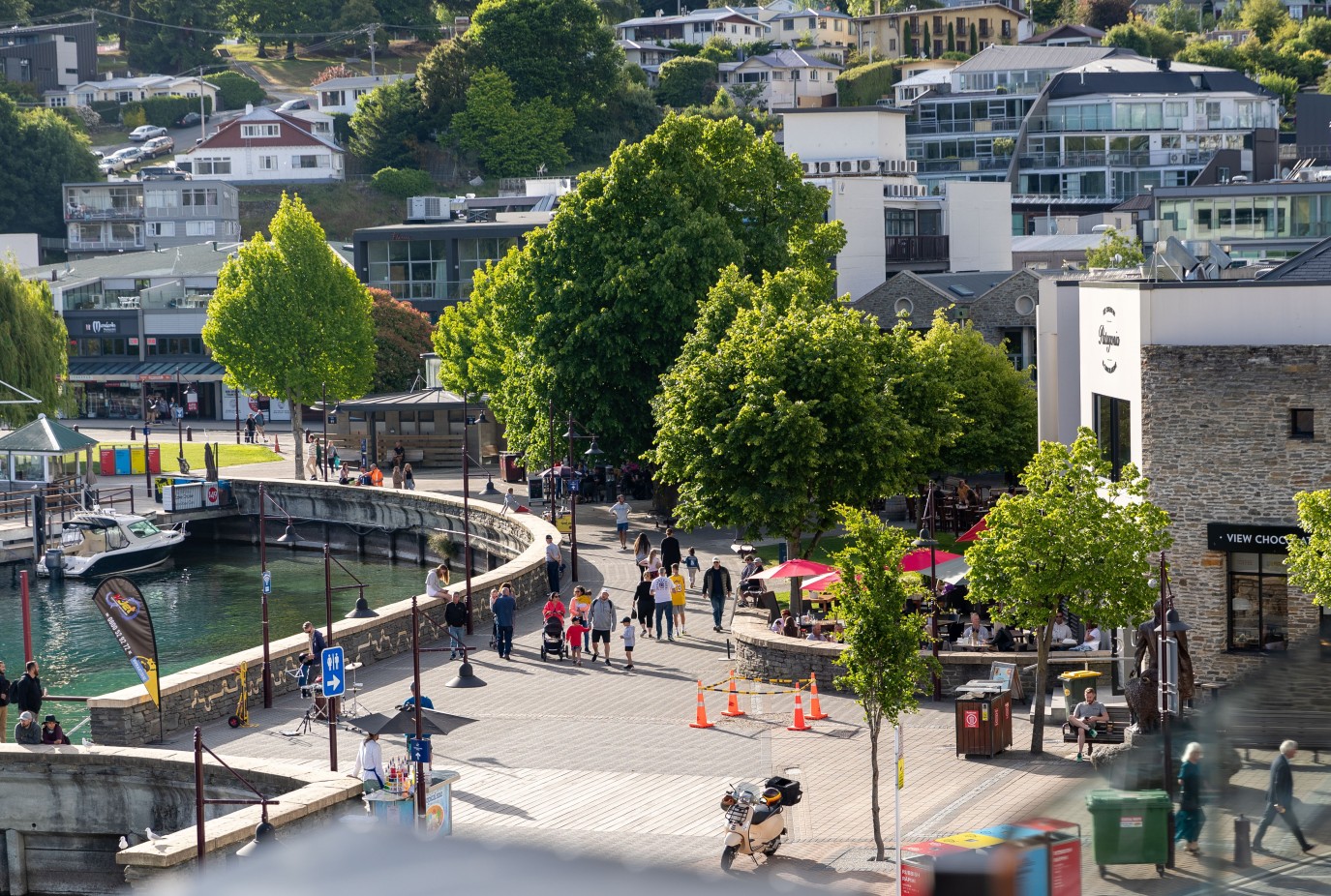
It’s a case of ‘make hay while the sun shines’ for Queenstown business ahead of another uncertain year.
Tens of thousands of holidaymakers have flooded into the district for the summer season, bringing much-needed revenue, as the tourism industry and life in general bounces back quicker than expected from years of pandemic restrictions.
But the rising interest rates, an attempt to curb inflation, are set to hobble household spending as mortgages roll off fixed terms, heralding a slowdown in economic growth.
Westpac senior economist Satish Ranchhod, in the bank’s latest Economic Bulletin, says he expects the Reserve Bank of New Zealand to hike the official cash rate again this month, potentially by 75 basis points to 5 percent.
Ranchhod tells Lakes Business it appears domestic spending is already beginning to soften.
“But I think we’re probably going to see the bulk of it really begin to be felt in the second half of this year,” he says.
“By that point, we will have had an increasing number of households rolling on to the higher rates, and will also have had further strong increases in consumer prices.”
Westpac’s figures don’t include a regional breakdown of the expected squeeze. Ranchhod says the impact will be varied across the country, depending on the economic make-up, and the district’s tourism and hospo-heavy economy could suffer.
“Domestic tourists will be a little more cautious about taking those trips, and probably a little more price conscious,” he says.
Queenstown Lakes could, however, ride the wave somewhat by relying on the return of the overseas tourists in greater numbers.
“On the international side, it’s a bit different. We’re looking at more of a structural recovery, so we’re actually picking that the number of international tourists is probably going to continue climbing over this year.”
It’s likely to be more gradual than the initial surge from the Australian market when the borders reopened, but the potential return of the high-spending Chinese market, now Covid restrictions are being removed, could provide another fillip for the district.
“For Queenstown, you’ve got that combination. The domestic side, probably going to be a little bit softer, but by the end of this year, the international market will hopefully provide a bit of an offset.”
As discretionary spending goes, shop-bought ice creams, burgers and cookies are luxuries that could be the canary in the coalmine signalling the tightening of belts.
The summer queues inside and outside Patagonia, Fergburger and Cookie Time suggest people are still treating themselves, despite increasing mortgages, rents, prices and fears about recession.
Patagonia owner Alex Gimenez estimates his ice cream stores in Queenstown town centre, Arrowtown, Queenstown Airport and Wānaka have been selling around 3000 litres of ice cream a day on busy days, such as New Year’s Day.
“We’ve bounced back much quicker than I expected and some days over the holidays have been back to pre-Covid levels,” Gimenez says.
“On other days, which are not so busy, we’re going through about 2000 litres across the four stores. It is really good but could be even better.”
The Queenstown store, on one of the busiest pedestrian intersections downtown - corner of Rees Street, Marine Parade and The Mall - is open the full 9am to 11pm on weekends, serving coffee and pastries in the mornings. But it doesn’t have enough pastry chefs to match those morning hours on weekdays.
“We have four but we’re still waiting for a fifth, who is coming in the next few months from overseas.”
Gimenez employs more than 120 staff across his venues and says staffing shortages have eased slightly on a few months ago, but only because more high schoolers are stepping into the roles.
He’s more worried about shortened opening hours hurting the town’s reputation, than looking too far ahead to a potential recession.
“The main problem we have is the disappointment of people who have come here on holidays, realising there is no place to eat because some venues are closed two times a week, and others do lunch or dinner.
“That is the shame of being in Queenstown at the moment. I think we are the embarrassment of the nation, to not be able to cater to tourists in the way we should.”
He blames both central and local Government for decisions on immigration and housing.
“It would be simple with the right political decisions because you can’t tell me there are not people who are keen to come here to work.
“And then the other big problem is accommodation. There are too many Airbnbs, so nowhere for staff to live, even when the hotels are not fully booked. It sucks.
“Everyone knows this, so the local government and central government need to do something. We need to be cleverer in the way we manage things.”
Fergburger group GM Stephen Bradly says recession or another significant downturn is also a bridge to cross if and when it happens.
“We can’t predict the future too accurately, if we could, we’d have seen Covid coming. So, for now, it’s just steady as she goes,” Bradley says.
The summer has been steady with busy peak days.
“It’s nice to see the queues back. I think it’s the same for everyone, it has been busy, and we’ve just been doing the best we can to manage it with our staff expectations.
“Any little lulls get bumped out by the fact some of us are having to close businesses or stores.”
The iconic venues employ 140 people are present, but a full complement would be around 175.
Queenstown’s still not at pre-Covid levels of busy in general, he says, with the missing Chinese tourists, which accounted for about 20% of business.
Across the holidays, accommodation occupancy has sat at around 80% full, although that’s forecast to drop to between 60-70% throughout the rest of January and February.
Vicki Onions, Cookie Time CMO and a co-founder of the recently revamped Bathhouse, says summer has been busy and businesses can finally see some light at the end of the tunnel.
“It’s been really tough for Queenstown,” she says. “We haven’t had customers, we haven’t had income. And then we’ve had customers, and we haven’t had staff. It’s a very different workforce than it was three years ago.
“But I feel, as a business, we are now in a really fortunate position. Tourism feels like it’s switched back on... people are coming back to our beautiful town and I am seeing a greater volume of qualified applicants as well.
“We’re getting to a place where we know there’ll be other challenges, but they won’t be the ones we’ve had up until now.”
